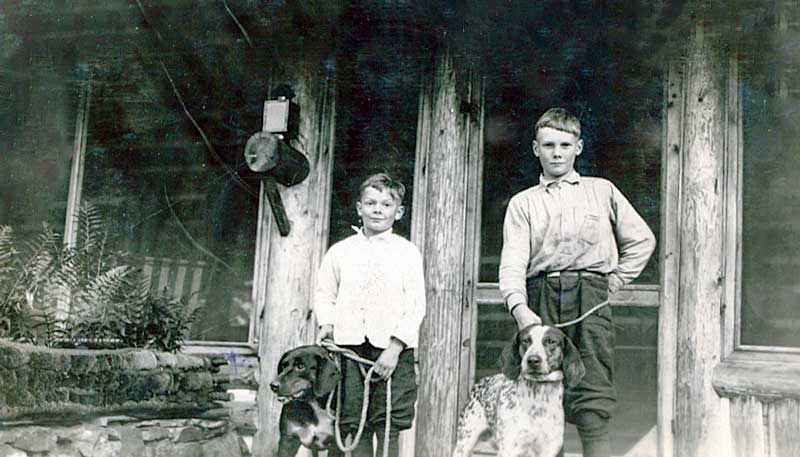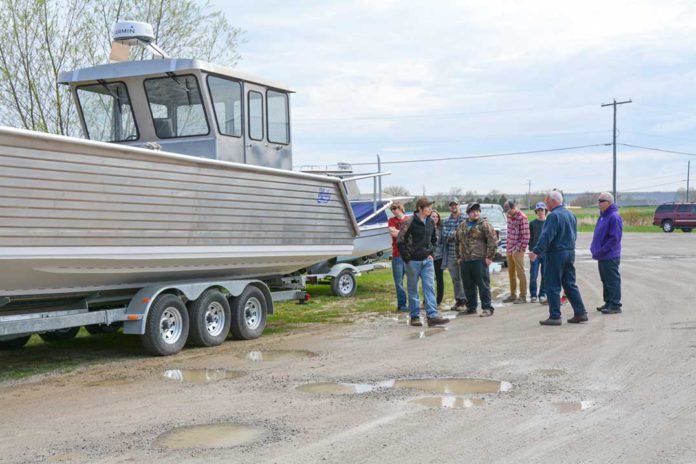By Petra Wall
Bid Smith
EDITOR’S NOTE: This story began on March 9 with an interview of Bid Smith at that time with one follow-up appointment with his daughter Bev Stevens. This writer was very upset and sad to hear that Bid had passed away on Monday, May 9 after a short illness. It was pure serendipity or good luck that we got his story in time. Bid was proud to be 100-years-old and in his own words, “still kicking.” His story was not changed after his passing was confirmed. It was left it the way he wanted us to see it and it is published with his family’s encouragement and support.
This Centenarian has been part of Manitoulin’s nostalgic transformation for over 100 years. He has been a resident of Little Current since his home birth on October 15, 1915 to Thomas and Mary Ann (nee Clark) Smith. In the early part of the 20th century, most babies were born at home with the assistance of a midwife. The hospital wasn’t set up for births as today. Older brothers Arnold (AJ), Austin, and Elmer welcomed little Orvil Francis, thereafter known as Bid. Clarence would be born later. “I was named after uncle Frank,” Bid explains, “and this place has always been home to me.” Hockey was an important aspect of this young man’s life and also in later years. Much of his working time was spent at his oldest brother AJ’s hardware store, helping with the family business.
Bid’s father Thomas and mother Mary-Ann were born at the end of the 19th century, in 1882 and 1884 respectively. They have always had close ties to Manitoulin as well. Thomas, the son of William Henry Smith and Sarah McLaughlan, was an early entrepreneur. He had a home construction business for many years. He would build a new home in Little Current, move his family in and then sell it again in a year or two so he could build another. “Three of the homes on this street (Baker Street in Little Current) were built by him. When I was old enough, I helped my dad build houses in the shoulder seasons.”
In the summer, the family moved to the Baker camp in McGregor Bay. Father Tom Smith looked after the cottages for 26 years. “During the summer, I helped guide the tourists at the camp, on fishing excursions for two dollars a day. There were lots of boats on site we could use and from time to time we would serve shore lunches for visitors.”
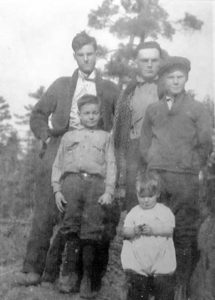
Mary Ann would home-school her children after they left school in May until late September when the cottages closed. The school provided the teaching materials. Mary Ann likely helped out at the camp too because she was a good cook. The family lived in the top of the boat house. “There is a photo of my parents at the window of the boat house, watching my brother and I playing in front,” Bid holds. “We used to go on a lot of picnics in McGregor Bay as well. Those were a lot of fun. A big wicker picnic basket, full of good food, would be enjoyed on Baker’s Island or on a beautiful, remote spot.” Daughter Beverly fondly remembers also going on these picnics when she was a little girl.
School was not something young Bid coveted. It interfered with all the activities he could be doing at home, like hunting or fishing. “I went as far as Grade 5. It seems I played hooky quite a bit so eventually they let me go so I could do what I really enjoyed.” The school burnt down in 1925 but Bid had nothing to do with that.
Hockey was a beloved sport for the Smith family. “I was about 10-years-old when hockey started on the Island. The original Little Current arena was built on Russ and Bill Collins’ land, where RONA Building Supplies was. We played our first hockey games right there. Austin, Elmer, Clarence and I played on the same team. We won 16 and tied one that year. There were no losses.” Many games were played in Killarney and the team travelled over the frozen ice from Manitoulin to Killarney, originally by horse sleigh and later by bus or by car. They would usually get home before dark.
“Sometimes there would be stormy weather during the trip to Killarney or on the way back but we always made it without mishap. For a game in Little Current, the trip was just as challenging. If we left from Baker’s in the fall, we used a boat to get to Birch Island, then we walked to the railway to catch the train to Little Current. To get to West Bay for a game, we occasionally had to skate Northern Channel to get closer to West Bay.” During the years the horses pulled the sleigh, trips to Gore Bay involved stops for fresh horses at Honora or West Bay. If it was really cold, the boys would jump off and run behind the sleigh just to keep warm.
“We had good teachers and coaches who also helped us win lots of trophies.” Dad Tom helped with the coaching in Little Current. Mary Ann agreed to the boys using her kitchen for hockey practice. Occasionally she would long for summer when her boys would stop hockey practice.
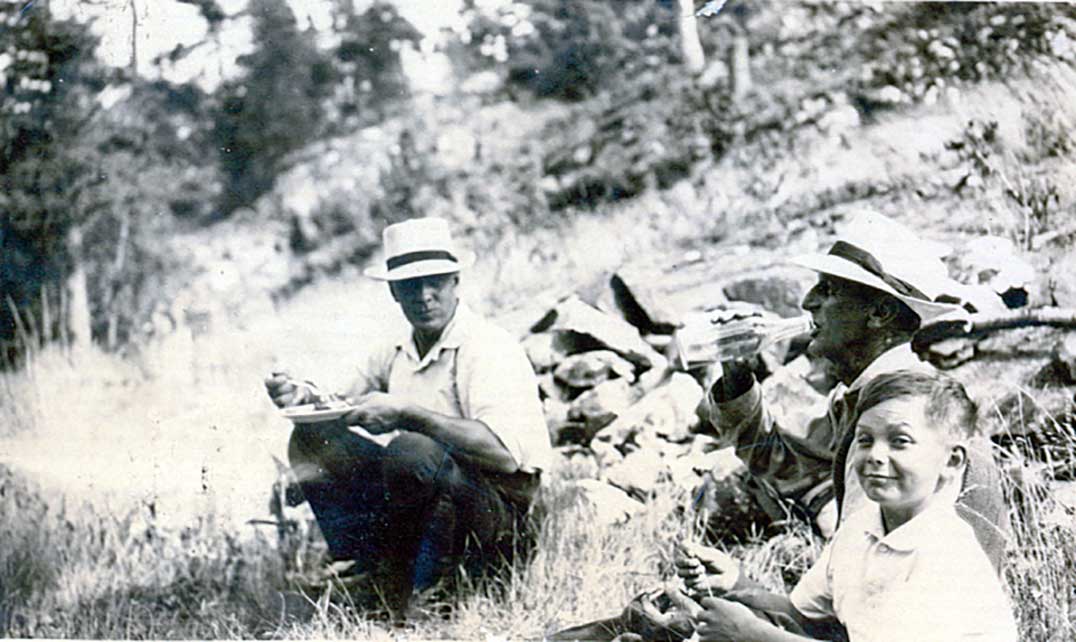
Austin played hockey in Chapleau after his teacher and coach moved from Little Current to that community and asked him to play on the new team. In due course, he became a barber and a carpenter but preferred the tourist business in later years. Austin developed his own facility, Smith’s Resort, on land beside where Harbor Vue Marina is now. He had three daughters to help him with the new venture.
Elmer was 15 when he moved to Cleveland to work in his aunt and uncle’s restaurant. He was also in the American war effort for a while. Clarence worked for Ontario Hydro. He was the captain of the hydro boat the ‘Nanabush,’ which delivered and erected hydro poles in remote locations. His team would also string the lines for the cottagers. Clarence loved to prepare meals on that boat.
“Austin, Elmer and Clarence learned to be carpenters. I really didn’t have any specific skills,” Bid shares. When he was old enough and the family moved back to Little Current from McGregor Bay in the late fall, Bid worked with his dad at Smith’s hardware, his older brother AJ’s store in Little Current. It sat next to Grant Turner’s store. AJ had come down with polio at age six and his disability necessitated getting help at the store. “I would do whatever AJ needed, stocking shelves, helping customers and selling them what they needed,” he explains. Daughter Bev adds, “He could sell anyone anything; he was that good a salesman. AJ appreciated Bid’s expert assistance.” Bid lived with AJ and his wife Irene at that time.
“Once I brought in a bear that I had shot. We put him up in the store for a while to both attract and startle the tourists. We didn’t leave it up long,” Bid recalls. At that time killing a bear was more accepted as a part of life. Today, displaying a dead bear in a public place might create more controversy.
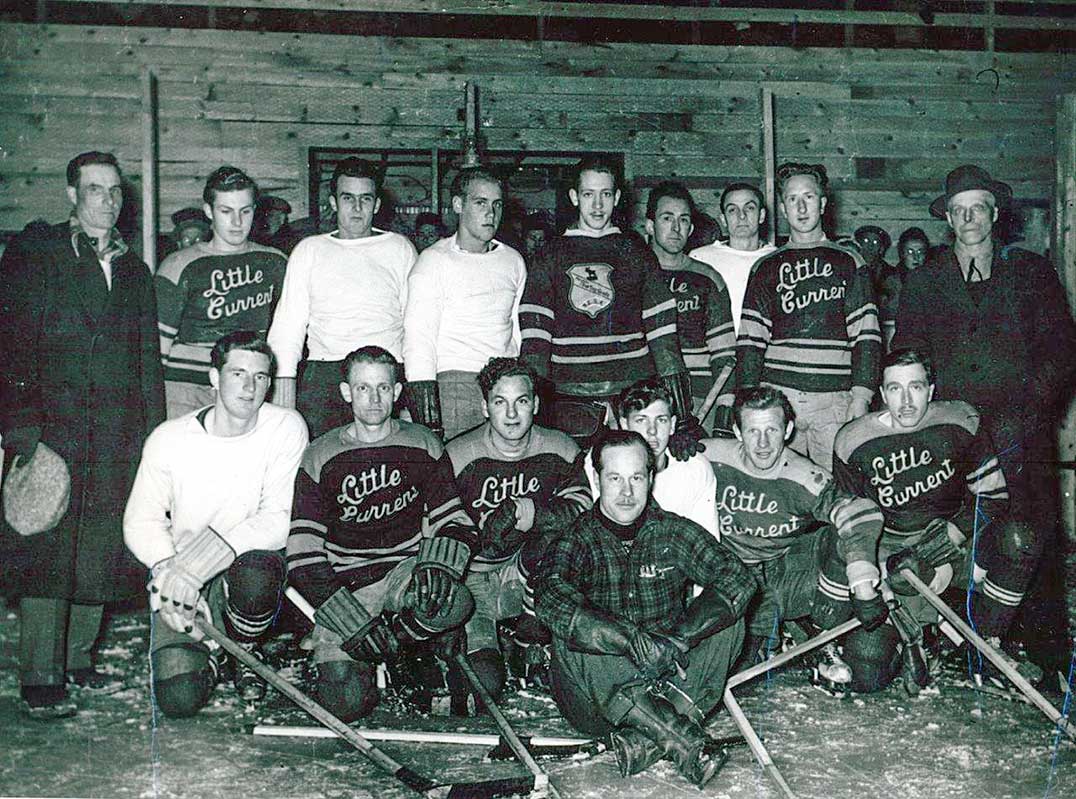
Bid met Catherine Miller at school in the 1920s. She would help him with words that he was not clear with. “She was pretty good looking, enjoyed dancing and she was a lot of fun.” They married on May 15, 1937. They had one daughter, Beverly.
“When I was about three or four,” Bev explains, “my dad was looking for extra income. Well-paying jobs on the Island were scarce, so my dad moved to Copper Cliff where he could fix motors at the smelter for INCO. It was good pay. I was seven when we moved to join him. We lived with another family until we found the stone house. I started school in Sudbury. After about a year, we returned to Manitoulin. Arnold (AJ) told him he could come back to work at the store. I started Grade 2 on the Island.”
Dew worms were sold in the store. Bid would pick the pink, stretchy worms from the wet grass, in the morning or the evening, using a flashlight. He was quite good at spotting and pulling them out without damaging them. A full can of worms would be brought to the store, placed into a box especially built for this purpose. Tourists would come in and buy them for bait. Bev admits, “When I picked the worms from the earth, they often split into two or more pieces. I wasn’t as good as my dad.”
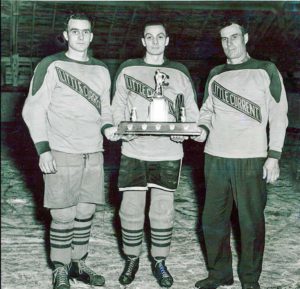
In the 1930s, Bid and his older brother AJ started to play in a band called the ‘Nighthawks.’ AJ played the saxophone and did vocals. Bid, 16, played the banjo. Other members were Harold Ham on violin, Mel Boyter on piano and Elmer Vincent on drums. They played in the Shaftsbury Hall and in Sheguiandah and for other groups. Tickets were 25 cents and each member of the band made five to six dollars per night.
“In the late 1940s and fifties, the Smith family had their own band for family get-togethers and other events. Uncle Clarence played the accordion, Aunt Marion played piano, Dad was on the drums and Walter Morphet joined us playing the fiddle,” Bev adds. “The band would play after the cattle sales in the Orange Hall (now the Masonic Hall) where dances were held. I remember dad playing the drums; his powerful rhythm would draw me to my feet,” she continues. “After the break, he would come for me. He taught me to dance. Ordinary dancing and round dancing were popular when I was growing up.” Sometimes Beverly would practice at home with her dad who let her step on his feet while he guided her through the motions. “He was fine with that until I started to lead, then that practice stopped.”
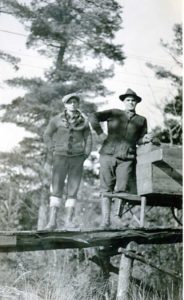
Bid, his brothers and his dad would go hunting for deer in season. “We gave away all the meat and the fish we caught to neighbours. Our family didn’t enjoy the wild meat but we enjoyed giving it away. Our neighbours and friends were happy.” Bev adds, “I remember going to the edge of town to the first hill and pulling suckers from the ditch; there was a culvert there and the fish were plentiful.” The family would catch them with their hands and load up the truck from the ‘sucker run,’ then drive slowly through town to distribute them to waiting families. “We caught two big sturgeons in the lake and put them in a tank for a short while, so people could see them. Then we released them again.” The big fish weren’t good eating and they could live to be quite old.
There is an Expositor photo of Bid in May of 1957 holding a rainbow trout, weighing over eight lbs, caught in the Manitou River. The fish has three scars deemed to have resulted from a lamprey eel attack. Another photo, also in The Expositor in March of 1984, has Bid holding a 15 lb laker caught in Lake Manitou. Fish were plentiful.
Then there was the time in April when Bid and the late Cecil McGaughey almost got swept out into the channel on an ice floe. Cecil had just returned to shore to warm up when he noticed Bid was moving away from him on a chunk of ice they believed was solidly connected to the shore. They had reached it by climbing along a fallen tree. By the time Cecil got a rope, Bid was 60 feet from shore. Using a tree as an oar, Bid finally inched his way back until the rope could be thrown to him. “That was the end of ice fishing that year.”
The family lost their Wilson Street home to fire a few years later. Bev knew something was up when all the calls on the party line at the farm where she was visiting were in ‘pig Latin.’ “I could tell something bad had happened but I didn’t know what. Apparently the neighbours had been told not to share anything with me so they communicated in code. I found out three days later when I came to town on Saturday night, and dad told me, ‘we don’t have a house any more.’ Our home had burned and my mother was away in Toronto.”
Bid explained that he had turned on the oil space heater and then had gone next door to visit his aunt while the house was warming up. He was standing in her living room when he noticed flames coming from his own home. He raced next door and threw open his front door to be met with a wall of smoke and flame. He realized saving the home was no longer possible. Bev adds, “When I arrived there three days later, there was nothing left but ashes. Everything we owned was gone, except the clothes on our backs.”
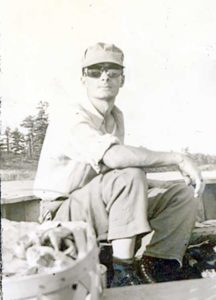
The family moved to the large storage area over the Smith’s Hardware after the fire. The Red Cross helped by providing some clothing and neighbours brought other needed items like dishes and cutlery. In due course, the family bought some empty land outside of town. They built a two-bedroom house with a basement and a cistern. There was no town water in that location. “I remember trying to get into the cistern a couple of times but my mother always caught me and I never did get to cool down by swimming in there,” Bev shares.
“Then there is George the duck. One day, my dad came home with this live fowl that someone had paid him with. He was ready to prepare it for a good family meal but mother and I did not want to eat this cute duck. We named him George and he was our pet for some time. Finally, he got to be too big and we didn’t want to keep him over the winter so he was slaughtered and mum cooked him. Both mum and I cried; we just couldn’t eat George.
Bid recalls winning the Pearson Cup for the Island senior hockey supremacy when he played as an adult many years later. Hockey was a favourite pastime for many of his adult years as well. Bid was a bit of a self-proclaimed ‘loner’ so he didn’t join many groups. He liked to fish and play cards. “I fished in the summer and played hockey in the winter. Cards could be played anytime.” A scrapbook of his hockey games, wins and losses was created from articles cut out of The Manitoulin Expositor.
“I enjoyed watching hockey with the original six teams. After we moved to the highway location we had to make do with our old black and white television. When that was on the fritz or the signal was not coming in, we would listen to the games on the radio. We never missed the play-offs.”
When asked to identify his strengths, Bid responds with a little dry humour, “eating and sleeping.” He claims there is nothing that he is afraid of and he has no regrets. Bev adds that he has a “good personality, good sense of humour and that he can sell ice to an Eskimo. He always said to us that he would live to be a hundred years-old. Now he is in his 101st year.”
“Little Current and Manitoulin have always been my home,” Bid shares, “I knew everybody here and everybody knew me. I had a steady job here and lots of friends. I was able to help my brother AJ who had been partially disabled by polio. I was his legs in the hardware store. AJ was my brother and my best friend for a long time. He taught me so much. My dad died at 71 in 1953. It was just AJ and me most of the time in the store and then AJ’s son Jerry came joined the business. The store didn’t close until 1986, after Jerry’s sudden death, so we had a good 50-year run.”
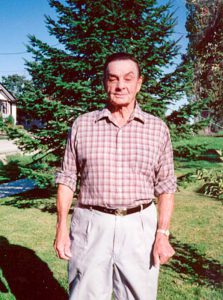
Back in 1936 when AJ bought the store from the Sims family, the population of Little Current was stated to be 5,000 people. “Blueberries were big business in the 1920s and 1930s. They were picked on the North Shore by the local Anishinabek population and brought into the store. We would trade 800-15 lb baskets on a Saturday morning. These would be taken to Owen Sound by boat on Sunday and sold there, at the open market, on Monday, for up to $1.50 each.”
“Everything we did back then seemed important to us. Now a big outing is taking the dog to the vet with Bev and I haven’t done that for quite a while. If I could go back in time, there is nothing I would change. I am not inspired by much now, I am just too old, but hunting and fishing used to get me going once upon a time,” Bid sums up. “My brothers were all very caring and considerate of others and they helped me a lot. I have already said that AJ was like a father to me, after my own dad died. I had a bout with cancer a few years ago, but they tell me it has cleared up now.”
“The world isn’t a bad place today, but I am not involved in the politics unless I am affected directly. Life has always been easy-going for me; we got by and that’s what was important. However, most of us also liked to kid around, be friendly and do the same things. That made life more fun.”
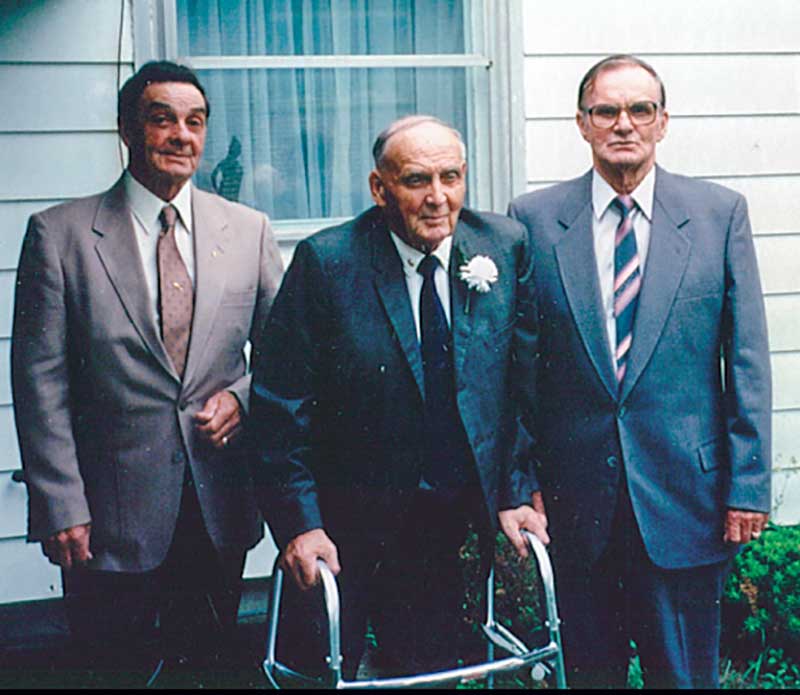
“Sudbury was just a short time in my life. We really had no good friends there, beyond a few of the other workers. The wives got together from time to time for shopping or other outings. There was no hunting or fishing nearby. We couldn’t wait to get back to Manitoulin. People are drawn to this place; they always come back. I never really enjoyed trips away either. I always wanted to stay here where I was comfortable. The Island is where I have always liked living the best and maybe that’s why I have reached this milestone in my life; I am proud to be 100-years-old. I am the last of the Smith boys, I was born October 15, 1915 and am still kicking. Love you all, especially my family, Bid”

